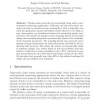Free Online Productivity Tools
i2Speak
i2Symbol
i2OCR
iTex2Img
iWeb2Print
iWeb2Shot
i2Type
iPdf2Split
iPdf2Merge
i2Bopomofo
i2Arabic
i2Style
i2Image
i2PDF
iLatex2Rtf
Sci2ools
150
Voted
DCOSS
2008
Springer
2008
Springer
An Adaptive and Autonomous Sensor Sampling Frequency Control Scheme for Energy-Efficient Data Acquisition in Wireless Sensor Net
Abstract. Wireless sensor networks are increasingly being used in environmental monitoring applications. Collecting raw data from these networks can lead to excessive energy consumption. This is especially true when the application requires specialized sensors that have very high energy consumption, e.g. hydrological sensors for monitoring marine environments. We describe an adaptive sensor sampling scheme where nodes change their sampling frequencies autonomously based on the variability of the measured parameters. The sampling scheme also meets the user's sensing coverage requirements by using information provided by the underlying MAC protocol. This allows the scheme to automatically adapt to topology changes. Our results based on real and synthetic data sets, indicate a reduction in sensor sampling by up to 93%, reduction in message transmissions by up to 99% and overall energy savings of up to 87%. We also show that generally more than 90% of the collected readings fall withi...
DCOSS 2008 | Distributed And Parallel Computing | Energy Consumption | Sensor | Sensor Sampling Scheme |
| Added | 19 Oct 2010 |
| Updated | 19 Oct 2010 |
| Type | Conference |
| Year | 2008 |
| Where | DCOSS |
| Authors | Supriyo Chatterjea, Paul J. M. Havinga |
Comments (0)

